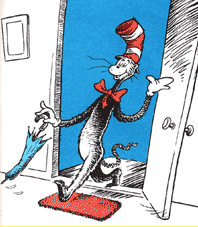
Welcome to Books as Autobiography, or personal canon post #1. Welcome to several books in my canon, starting with THE CAT IN THE HAT by Dr. Seuss.
This is the first book I remember reading by myself. Not only do I remember reading it, I remember the moment I learned to read, the moment that letters formed themselves into words that I could understand on the page, sound out myself, say out loud -- read. It was magic, pure magic, and my life would never be the same. Learning to read was one of the pivotal events of my life; from this book flowed all others, so I must honor it and give it its number one place on my bookshelf.
THE CAT IN THE HAT was published in 1957, when I was four years old. It would have been a newly published book in my home, a book my parents bought for me and my brother. I don't remember my mother reading it to me, but she must have... yes? I don't remember my mother reading to me much at all, but I do remember always having books around the house, and I vividly remember my father with his nose in a book. I don't think my mother was much of a reader, although she came to mysteries at some point and devoured those.
I was a solo reader early. The very idea that words represented stories thrilled me, although I couldn't articulate that when I was young -- I just knew that something juicy was held within the pages of a book, and I wanted to read it. It was something I could do well when, all through the years of my growing up, I felt there were so many things I couldn't do.
I loved the rhyme in THE CAT IN THE HAT (it's still brilliant, to me, today, how 223 words, arranged in anapestic tetrameter, tell such an engaging, enduring story). I loved the sense of naughtiness that the Cat flounced around with, his devil-may-care attitude, and his sincere sadness at being sent away, unappreciated, at the end. I loved the humor -- I laughed out loud. I loved the absurd. I loved the independence of Sally and her brother, obviously latch-key kids, which in 1957 was unheard of... here came Mother through the door, in her heels and dress, home from work -- yes? That was my interpretation. I didn't realize until I was much older, how much that independence meant to me... but more on that later.
THE CAT IN THE HAT was radical, a breakthrough in children's books and a blessed balance to the Dick-and-Jane childhoods that passed for children's books at that time in schools, but all I really understood when I was five-years-old was that I could read this book.
I wouldn't have known that I was learning phonics in school, but that's how I learned to read, by learning the connections between letter patterns and the sounds they represent.
Wikipedia's entry on phonics states: "Phonics instruction requires the teacher to provide students with a core body of information about phonics rules, or patterns."
I clearly remember learning these patterns... along with the pattern of daily life in my family home, the patterns of morning-noon-night, the patterns of the seasons and more -- I was decoding the world I lived in, and I found it exhilarating. Reading was another method of decoding. There were patterns to figure out -- let me at 'em!

I stared at those letters, and they began to make sense to me. I couldn't, and then suddenly I could -- I could read. I also could learn... all by myself. I could begin at the beginning -- with anything -- and start to decode it. This knowledge, this desire, has stayed with me all my life, and it is how I have approached learning -- begin at the beginning. What is the foundation of what I want to learn? Go back and find out. You'll see me do this as I write about more of my personal canon. This is a skill I've learned to use in my life with anything new I want to learn.
And one more reason this book is part of my personal canon: I was there at my daughter Alisa's magic moment when she learned to read -- the book in her lap was THE CAT IN THE HAT.
As a child, I went on to read all the Dr. Seuss I could get my hands on, and I loved much of it, especially AND TO THINK THAT I SAW IT ON MULBERRY STREET and GREEN EGGS AND HAM (I thought HORTON HATCHES THE EGG was unbearably sad).
I loved, too, THE
LORAX, and placed it in my canon because it is the first environmental picture book (or book) I read, and I read it aloud, over and over again, to my two oldest children, who especially loved it in the 1970s. It heavily influenced my thinking about the environment (so it changed my life) at a time when environmentalists (in a just-emerging field) were considered wackos by so many. I went back to the beginning, to see what I could see, and began to read the nature writers -- John Burroughs, John Muir, Edwin Way
Teale (I loved THE COURAGE OF TURTLES), John
McPhee, Hal
Borland, Annie Dillard, Rachel Carson and more -- I have a collection of these books on my canon shelves, and I pull one to me now and then and read a section in it -- I am always transported to those days of intense nature reading. I can trace it back to THE
LORAX and my curiosity. I can trace my interest in ecology and the environment to this book. To other things as well, of course... but we're talking books here.
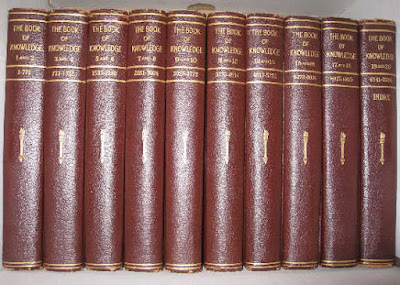
I was a kid with an insatiable curiosity, so it's no surprise that I would gravitate to a set of encyclopedia-like books called THE BOOK OF KNOWLEDGE. These twenty books (with yearly updates in supplements) lined my father's office walls, and included a character education booklet and a "Graded Course of Study" that contained study outlines for every school subject -- geography, history, literature, biology and much more.

The index was in volume 20, so if I wanted to learn about, say, Pilgrims, I would look it up in volume 20, where I would be referred to all the articles on Pilgrims throughout the 20-volume set.
This set of books was a treasure trove for me. I spent hours just reading through it -- there was so much that was fascinating in those pages.

I'll end with another set of books that opened the world of literature to me as a child. These books also were in my father's "office," a book-lined room at home, where my dad payed bills and cut-and-spliced 8mm (or was it 16?) movie film from his home movies, and where he had a room of his own, full of the Time Life series of books on nature, and science -- all the Popular Mechanics series, and that BOOK OF KNOWLEDGE.
But the ones I'm remembering now as pivotal to my learning and becoming were big thick books of stories in THE JUNIOR CLASSICS, published by P.F. Collier in 1960. There were ten books, and I worked my way through most of them, reading "Stories About Boys and Girls," and "Stories of Wonder and Magic" and "Fairy Tales and Fables" and more... heroes, animals, sports, history, and an entire volume on poetry -- one of my earliest introductions to poetry. Every genre was there -- and I was steeped in story, Sunday after Sunday afternoon or summer day after summer day, lying on the bed reading from these volumes.
This was were I first saw Randolph
Caldecott's work. He illustrated many of the stories in the "Fairy Tales and Fables" volume. I was struck by the color and detail and life in those paintings. This was were I began to really look at illustration, too -- the illustration of Prometheus bound to the rock in "Myths and Legends" was almost too much to bear (literally) -- he wore barely a loincloth and it blew in the wind. His muscles rippled. He reached out a hand in supplication. I wanted to help him. And something in me made me look away, too.
I got lost in the illustration in these books, in the line drawings in THE BOOK OF KNOWLEDGE, and in the Dr. Seuss as well -- I was getting an education in illustration and didn't know it. I was learning to appreciate different styles.

I was also developing my own voice, although I wouldn't have known that yet, either. I tell my students today that, in order to write well, one must READ. Read and read and read. Then read some more. Nothing prepared me for being a writer more than reading did.
And none of this was directed reading. I was reading for pure pleasure, and for knowledge because I wanted to KNOW -- it's one of
Maslow's five basic human needs: to know and understand.
I wanted to be entertained, too. I was reading because it soothed me. And because, on a level I could not understand, reading was forming me -- it organized my mind and
thoughts, it gave heft to my sensibilities, my desires, my personality, and my way of seeing. Reading would save my life -- I'll talk about this in future canon posts. Reading would dictate my future. It would refine what it meant to me, to be human in the world.
What are your first influences in books? Jerrod T. writes to say (after reading yesterday's post about canons), "Not everyone reads or is read to. Not everyone is a reader by nature. What about those people? Do they have personal canons?"
A canon in music, in nature, in food, in friends... there are many ways to define your life. For our purposes here, however, I'm interested in uncovering autobiography in books... why do you keep certain books on certain special shelves? What did they mean to you when you read them, and how have they informed your life and who you have become? Where have they taken you?
I hope you'll keep a notebook dedicated to these stories you uncover. They will spark all kinds of personal narrative, essays, memoir, fiction. Even if you never publish them, you will own your own story (no small feat)... and you can share your story with others.
 Come see me! It's free! It's on the Square in downtown Decatur, Georgia -- just outside the city of Atlanta. It's year three of the fabulous Decatur Book Festival. I'll be part of the SIBA Book Award panel at 5:30 on Saturday, and I'll be presenting on the children's stage on Sunday at 4pm.
Come see me! It's free! It's on the Square in downtown Decatur, Georgia -- just outside the city of Atlanta. It's year three of the fabulous Decatur Book Festival. I'll be part of the SIBA Book Award panel at 5:30 on Saturday, and I'll be presenting on the children's stage on Sunday at 4pm.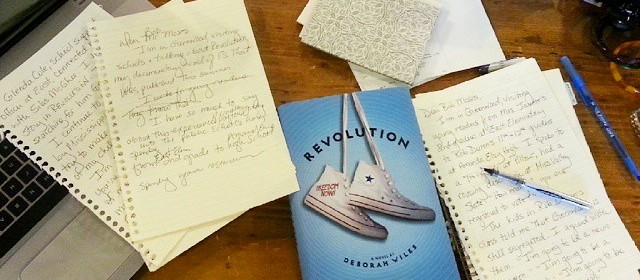


 So the past two weeks have been all about story -- the political process unfolding this week and next, and the politics of 1962, the year of the Cuban Missile Crisis. I'm trying to get the details right -- and I'm asking for help: Tom West is a geek. Is "geek" a word that would have been used in 1962? Would "nerd" be better? I've done a search, but so far haven't been able to figure this out. I need the right word -- it may be something else altogether. Weirdo. I don't know what we used for "geek" then. I can do a more thorough search at some point, but for now, I'm trying to keep moving.
So the past two weeks have been all about story -- the political process unfolding this week and next, and the politics of 1962, the year of the Cuban Missile Crisis. I'm trying to get the details right -- and I'm asking for help: Tom West is a geek. Is "geek" a word that would have been used in 1962? Would "nerd" be better? I've done a search, but so far haven't been able to figure this out. I need the right word -- it may be something else altogether. Weirdo. I don't know what we used for "geek" then. I can do a more thorough search at some point, but for now, I'm trying to keep moving. This morning I read, in one opinion piece, that the Democratic National Convention is so boring it's fascinating. Thinking for myself, I have to agree. ha! But truly, so many history-making moments are happening this week -- I remember, waaaay back in 1984 , when Geraldine Ferraro was tapped for Walter Mondale's running mate... I made sure my eldest daughter, then 12 years old, sat in front of the television with me to watch that historic moment. "Remember you were here, and remember this day," I said.
This morning I read, in one opinion piece, that the Democratic National Convention is so boring it's fascinating. Thinking for myself, I have to agree. ha! But truly, so many history-making moments are happening this week -- I remember, waaaay back in 1984 , when Geraldine Ferraro was tapped for Walter Mondale's running mate... I made sure my eldest daughter, then 12 years old, sat in front of the television with me to watch that historic moment. "Remember you were here, and remember this day," I said.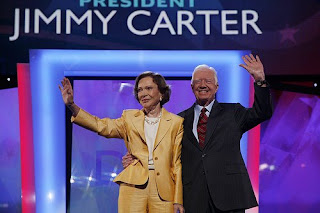 I'm hooked these days, both on the political process and the 1960s. I'm watching
I'm hooked these days, both on the political process and the 1960s. I'm watching 
 When I gave DELTA WEDDING to my mother, she handed it back months later saying she couldn't get through it. "Nothing happens!" she said. "Ellen gets up in the morning and says, 'I think I'll move this bush from here to there' -- I just couldn't go on!"
When I gave DELTA WEDDING to my mother, she handed it back months later saying she couldn't get through it. "Nothing happens!" she said. "Ellen gets up in the morning and says, 'I think I'll move this bush from here to there' -- I just couldn't go on!"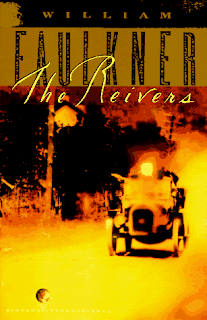 ...until you are in love with the characters and the setting and the possibilities as much as you are the problem... we want you to know us for life, we southerners... we want you to fall into our stories, to consider our characters as real people -- in my case,
...until you are in love with the characters and the setting and the possibilities as much as you are the problem... we want you to know us for life, we southerners... we want you to fall into our stories, to consider our characters as real people -- in my case, 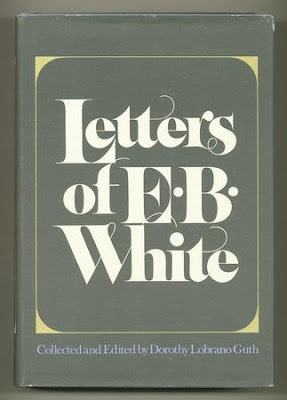
 For years, I waxed enthusiastic about White to anyone who would listen. A friend who went to Maine brought me back pictures of White's farm. Another, years later, brought me photos of White's grave. I knew all about son Joel and the
For years, I waxed enthusiastic about White to anyone who would listen. A friend who went to Maine brought me back pictures of White's farm. Another, years later, brought me photos of White's grave. I knew all about son Joel and the  Write with nouns and verbs.
Write with nouns and verbs.

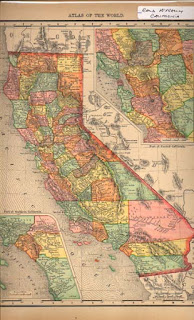 I love that one of Walter's picks is the Rand
I love that one of Walter's picks is the Rand 
 I stared at those letters, and they began to make sense to me. I couldn't, and then suddenly I could -- I could read. I also could learn... all by myself. I could begin at the beginning -- with anything -- and start to decode it. This knowledge, this desire, has stayed with me all my life, and it is how I have approached learning -- begin at the beginning. What is the foundation of what I want to learn? Go back and find out. You'll see me do this as I write about more of my personal canon. This is a skill I've learned to use in my life with anything new I want to learn.
I stared at those letters, and they began to make sense to me. I couldn't, and then suddenly I could -- I could read. I also could learn... all by myself. I could begin at the beginning -- with anything -- and start to decode it. This knowledge, this desire, has stayed with me all my life, and it is how I have approached learning -- begin at the beginning. What is the foundation of what I want to learn? Go back and find out. You'll see me do this as I write about more of my personal canon. This is a skill I've learned to use in my life with anything new I want to learn.

